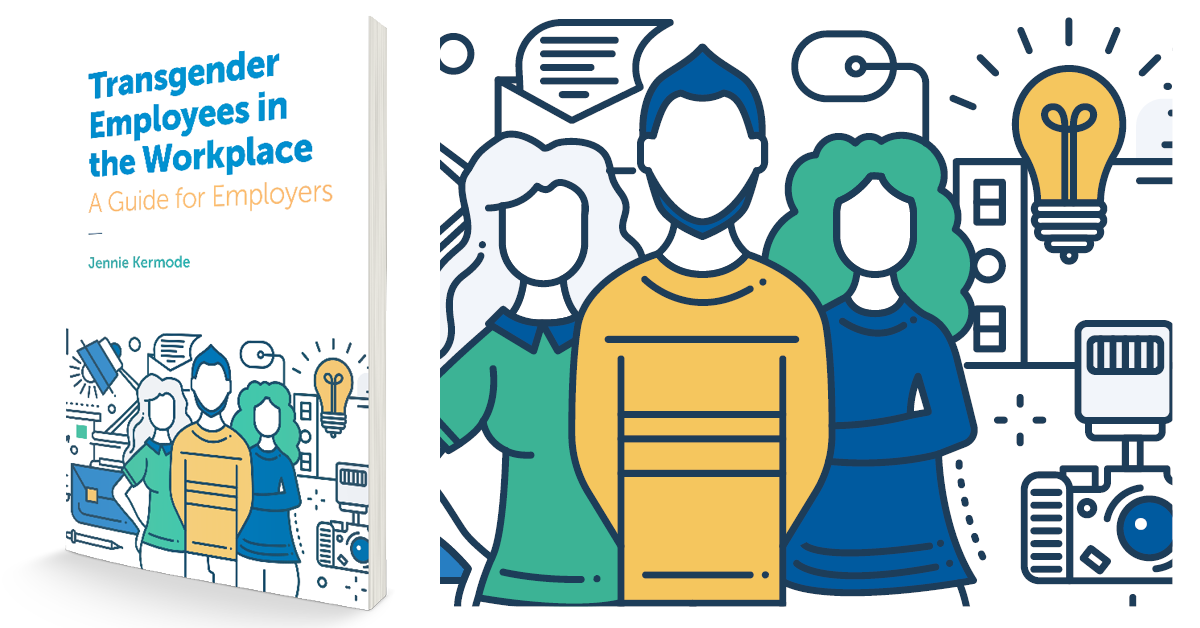Jennie Kermode, chair of Trans Media Watch, shares her advice for employers on how to make the work place supportive and inclusive for trans and non-binary people.
Proportionate to their numbers in the general population, trans people are under-represented in the workforce. If your company is positive about diversity and has a friendly workforce and sound policies on inclusion, yet you’re still not managing to recruit trans people, what can you do about it? Are you missing out on potential talent because people don’t see you as approachable? How can you make sure that your recruitment process is up to scratch?
Advertising
A Totaljobs survey recently found that 43% of trans people seek out trans-friendly employers when looking for jobs. This means that it’s worth sprucing up your website to make sure your diversity policy is easily accessible and to stress that your organisation is committed to equality. It also means, however, that advertising in mainstream publications might be passing trans people by. If you advertise in publications aimed specifically at the LGBT community, trans people will see this as evidence of your good intentions, and will be more likely to apply. You can also try contacting trans support groups in your local area to let them know that you’re a friendly employer, or approaching national organisations like Stonewall and Proud Employers where you can be listed as such.
Application
For trans people, job application forms can be daunting, but there are several things you can do to resolve this:-
- Don’t ask for previous names unless you specifically need them. Doing so can make people feel forced to out themselves.
- Offer a gender neutral title option like Mx or Per. You can also offer an ‘other’ box, but making gender neutral options visible sends a clear supportive signal, even to trans people for whom they wouldn’t be appropriate.
- Note that applications from minority groups are welcome, and list some examples, including transgender people. Don’t rely on using the acronym LGBT as many trans people have had disappointing experiences with people who say that but only really mean ‘gay’.
- If you will need to make background checks, don’t ask for potentially sensitive information at the application stage but note that it will be needed before a formal offer of employment can be made. For DBS checks, stress the option of using the DBS confidential service, which allows gender history to remain private.
Interview
Never ask somebody if they’re trans during an interview, even if you want to assure them that it’s okay with you. Always leave any decision about whether or not to come out up to them. Remember that the ideal interview is a two way conversation and take the opportunity to talk about the ethos of your organisation – this can be a good way to mention your commitment to diversity. Make sure everybody involved in the interview process shares that commitment so you don’t have to worry about inappropriate behaviour or bias in your team. If an interviewee does come out as trans, ask them if there’s anything they need from you as an employer by way of support, such as time off for medical appointments. Make it clear that a need for support won’t make you less likely to hire them, then move on to other matters, showing that you don’t consider it to be a big deal.
Introduction
Once you’ve decided to hire a trans person, the next move is to introduce them to your existing employees. Never tell anybody they’re trans unless they have given you explicit permission to do so. If they’ve already completed transition, they might not consider it necessary. They may prefer to tell people themselves. They may just want select people to know, such a senior members of the HR team, or they may prefer that everybody find out at once, either directly from them or in a speech or email from you. There’s no one size fits all solution. The important thing is to make sure that they’re welcomed into the workplace and that they know who to turn to in the event of any difficulties.
Because of the extra challenges they face in finding jobs, trans people tend to be loyal and hardworking employees. Making a few changes in your recruitment process – and making sure any recruiters you work through take the same approach – can be very much worth your while.
Jennie Kermode is the chair of Trans Media Watch, a charity promoting positive media representations of the transgender community.
Her new book, Transgender Employees in the Workplace, is out now.
Why not follow us on Facebook @JKPGenderDiversity or join our mailing list for more news and updates from our authors.
